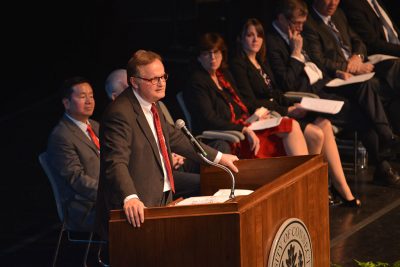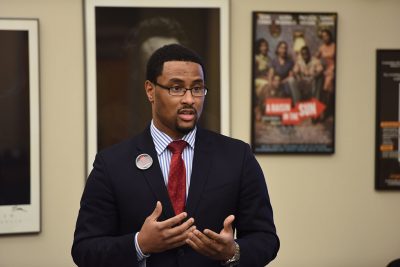Maine Public Radio (Neag School’s Don Leu was interviewed about digital literacy and online source reliability)
Schools Key to Solving Fake News Problem, Says UConn Expert
UConn Today (In response to the fake news epidemic, Neag School’s Don Leu was interviewed about the need to focus on internet literacy in schools)
Del Siegle Named Associate Dean for Research and Faculty Affairs

Professor Del Siegle has been named Associate Dean for Research and Faculty Affairs for the Neag School.
Siegle, a professor of gifted education in the Neag School’s Department of Educational Psychology, where he has served as department head since 2011, will officially join the Dean’s Office leadership team on Jan. 3, 2017.
In his new role, Siegle will serve as the dean’s designee on all matters related to research and faculty affairs and will work collaboratively with departments, programs, faculty, professional staff, and others on a range of responsibilities, including overseeing faculty personnel matters; providing leadership for the research enterprise in the Neag School; facilitating faculty development in the areas of tenure, promotion, and research; and serving as the liaison between the Neag School and UConn’s Office of the Vice President for Research.
“Del has a depth and breadth of knowledge and
far-reaching scholarly success in education research
on the national and international levels that make
him an ideal fit for this position.” Dean Gladis Kersaint
“Del has a depth and breadth of knowledge and far-reaching scholarly success in education research on the national and international levels that make him an ideal fit for this position,” says Dean Gladis Kersaint. “We’re excited to have him take this position on as the Neag School continues to advance its research efforts and pursue meaningful scholarship in its strategic areas of focus, and we are grateful to Sandy Chafouleas for her dedicated service in the roles of Associate Dean and Director of Research over these past two years.”
Siegle joined UConn in 1999, after serving four years as an assistant professor at Boise State University. He is a past president of the National Association of Gifted Children and has served on the board of directors of The Association for the Gifted. He is chair of the AERA Research on Giftedness, Creativity, and Talent SIG. He was co-editor of the Journal of Advanced Academics and is currently co-editor of Gifted Child Quarterly. He also writes a technology column for Gifted Child Today. His research interests include web-based instruction, motivation of gifted students, and teacher bias in the identification of students for gifted programs. Along with Gary Davis and Sylvia Rimm, he is an author of the popular textbook Education of the Gifted and Talented (6th ed.). He is the principal investigator and director of the National Center for Research on Gifted Education (NCRGE).
Related Story: Scott Brown Named Head of the Department of Educational Psychology
Principal Schilke Says Goodbye After a Decade at Smith Middle School
The Courant (Neag School UCAPP mentor, and now clinical supervisor in the UCAPP program, Donna Schilke recently retired)
Keys to Creating Makerspaces
District Administration (Neag School alumnus Salvatore Menzo is quoted in the article)
Connecticut School Finance Project Proposes Special Education Funding Model
New Haven Register (The Neag School co-partnered with the Connecticut School Finance Project to help determine a special education funding model)
Who’s In Charge? State vs. Local Control
Connecticut Mirror (Neag School’s Michael Coyne is quoted on the positive impact of early intervention for reading)
‘Fake News,’ Bogus Tweets Raise Stakes for Media Literacy
Education Week (Neag School’s Donald Leu comments on media literacy and recent trend of fake news)
A Call for a Language Shift: From Covert Oppression to Overt Empowerment

With increasing shifts in racial and ethnic demographics in the United States, the national conversation on diversity and inclusion is ever evolving. Several terms have become commonplace in identifying racial and ethnic groups that are disadvantaged by interlocking, oppressive systems, such as White supremacy, patriarchy, and neoliberal capitalism. Among the most popular phrases currently used to describe groups that have been historically underserved based on their race is “People of Color.” Another common term used to describe these groups is “minorities.” One intention behind using these terms is to emphasize the overlapping or shared experiences with discrimination, marginalization, and oppression on the basis of racial, ethnic, and/or cultural identities. These terms also seek to acknowledge and magnify the reality that all racial and ethnic groups do not experience the same privileges. Despite the well-intentioned nature of these terms, I argue they covertly serve to reinforce racial hierarchies and perpetuate problematic status quos.
In response to the problematic nature of terms such as
“People of Color,” “minorities,” “marginalized groups,” and “oppressed groups,” I call for a shift in language. In the pursuit of a more equitable and just society, it is
important that we develop and use language that disrupts oppressive systems.
Critique of the Status Quo
One primary issue with the phrase “People of Color” is that it normalizes and privileges Whiteness. For example, by separating White from this label in direct contrast to a cluster of multiple racial and ethnic groups, this phrase reinforces White superiority. In fact, on a pathological level it reiterates the humanization of Whites and dehumanization of racial groups across the Africana, Latina, Asian, and Native American Diasporas. The reality is that White indeed is a color, and people from all racial and ethnic groups deserve human dignity, liberties, and supports for holistic development. Despite existing in a White neoliberal capitalist society that values lives differently based on race, ethnicity, socioeconomic status, and among multiple identity categories, if we as a society are committed to celebrating racial, ethnic, and cultural diversity and inclusion — rather than using differences as a basis for discrimination and oppression — then our language and related systems and social practices should reflect this valuing accordingly.
Another issue with the phrase “People of Color” is it implicitly suggests that, in order to value and focus on the issues impacting these groups, we need to cluster them together, which diminishes the uniqueness of their differences between and within groups. These differences include variations in sociocultural histories, migration patterns and experiences, economic opportunities, and related circumstances. For example, there are more than 33 ethnic groups and nationalities under the Latina Diaspora and upwards of 50 within the Africana Diaspora. No doubt there are intersecting oppressions, but there are also distinct differences worthy of acknowledgment, critical examination, and concerted action.
The term “minorities” is also problematic on multiple levels. Minorities can be interpreted numerically or symbolically. Numerically, the term is always contextual and refers to a group that represents less than 50 percent of a given a population and oftentimes less than 30 percent. Hence, the definition of minorities in a numerical sense focuses on representation. However, the pervasive use of this term dismisses the fact that certain groups are not numerically fewer in representation in every context. For example, Blacks and Latinas are not always numerical minorities in every geographical context (e.g., urban environments in the U.S. — or globally, for that matter) or every institutional context (e.g., Historically Black Colleges and Universities (HBCUs) and Hispanic Serving Institutions (HSIs)). Thus, context matters when this term is applied. Organizations often mask the underlining issues of a lack of diversity by clustering a range of groups deemed as “minorities.” For example, many institutions tout attaining high levels of diversity by grouping numerous “minority” groups together while minimizing or disregarding specific inequities related to certain racial and ethnic groups (e.g., higher numbers of international students from Asian countries conflating overall diversity numbers while persistently attracting lower numbers of African-American and Latina students from within the U.S.).
Symbolically, the term “minorities” implies an inferior or deficient status. Often, terms such as “dominant” and “marginalized” are juxtaposed and used to describe socially constructed power dynamics within a given context. However, the referencing to groups in this way distorts the perceived possession of power by positioning groups who are being oppressed as powerless, and “dominant” groups as controlling all the power. Hence, without the qualifying term “numerical” to the term “minority,” frequent references to “oppressed” and “marginalized” can perpetuate and exacerbate pathological assumptions about human worth and potential for positive change.
The language we use and how it is interpreted can consciously and subconsciously perpetuate dehumanization, marginalization, and oppression.
Shifting Our Language
In response to the problematic nature of terms such as “People of Color,” “minorities,” “marginalized groups,” and “oppressed groups,” I call for a shift in language. In the pursuit of a more equitable and just society, it is important that we develop and use language that disrupts oppressive systems. This shift involves replacing language used to describe specific conditions based on systemic oppressions rather than defining groups of people. As such, this shift rejects oppressive terms while continuing to recognize inequitable systems, but promotes more affirmative, empowering, and humanistic terminologies. By shifting the language, we can upend and challenge, rather than reinforce and strengthen, inequitable power structures.
One phrase involving the use of empowering language that does not define a group or groups by encounters with oppression is Powerful Groups Targeted for Oppression (PGTOs). This term emphasizes the humanity and power within groups while still acknowledging the reality of oppressive systems. Using this language will shift the thought process and self-identification within one’s self (as well as within society at large) as more affirming and empowering, rather than focusing solely on the condition of being oppressed and marginalized. Specific terms — such as “racial,” “ethnic,” “cultural,” “sexual identity,” and “religious affiliations” — can be inserted between the words “Powerful” and “Groups” to focus on and address the specific issues impacting these groups. The terms “targeted for” can be replaced with “subjected to” based on the context, relevance, and application. For example, in place of the phrase “Women of Color,” the phrase “Powerful Women Subjected to Intersecting Oppressions (PWSIOs)” could be used. In addition, the term “oppression” can be used interchangeably with marginalization, underrepresentation, economic deprivation, educational neglect, exploitation, or related terms. The existences of these aforementioned terms in specific contexts can be framed as a condition associated with their lived experiences/realities, but it does not have to be how they are defined holistically.
A second recommendation for replacing status quo references to racial and ethnic groups is to list the groups that are focused upon either separately or collectively. For example, Black, Hispanic, Asian, Native American, and/or Multi-Racial Groups (BHANAM) and/or individuals across Africana, Latina, Asian, and Native American Diasporas (ALANDs) could be used. Specificity can be incorporated as necessary to ensure that nuanced differences, as well as overarching similarities, are recognized. This naming of specific racial and ethnic groups acknowledges each groups’ uniqueness and centralizes core aspects of their cultural identities and lived experiences.
Language matters. The recommendations put forth here should also be considered and expanded to language used for various identity categories. The language we use and how it is interpreted can consciously and subconsciously perpetuate dehumanization, marginalization, and oppression. Contrarily, we can use language to uplift, empower, and transform human cognitive processes and interactions toward a more equitable society.
Joseph N. Cooper is an assistant professor at the University of Connecticut’s Neag School of Education. He recently was honored with the Neag School’s 2016 Outstanding Early Career Scholar Award.
Mathematician Attends White House Computer Science Education Conference
College of Liberal Arts and Science (Neag School doctoral student, Amit Savkar, was part of a Connecticut educator group that went to the White House)
